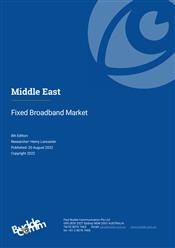Middle East - Fixed Broadband Market (Bundle 11 reports 2022-2023)

Last updated: 30 Aug 2022 Update History
Report Status: Current
Report Pages: 299
Analyst: Henry Lancaster
Middle East’s fixed broadband deployment gains investment interest
Most countries in the Middle East region continue to work towards expanding the reach of fixed broadband infrastructure, complementing the wider reach already achieved by mobile networks. The expansion of fixed broadband infrastructure is generally undertaken by private sector players focussed on urban areas, though there is also considerable state support towards creating a digital transformation affecting societies, businesses, and governments.
The pandemic has provided a significant impetus in this regard. To a greater or lesser extent, a large proportion of people in these countries has been obliged to work from home. With bans on travel and restrictions on social interactions, people have looked to online entertainment. Schools and universities have moved to online learning and digital classrooms. Businesses have transitioned to arrangements whereby employees, where practical, work from home and perform tasks online. With the closure of retail outlets and other restrictions, a greater proportion of transactions is undertaken online, via e-commerce or m-commerce.
In all, these various forces are expediting the pace of existing national broadband plans which have been set in train over the last few years. Some of these plans have long-term schedules (through to 2030 or even 2040), are supported by state funding and are generally being deployed by incumbent telcos or their subsidiaries created for the purpose.
A transition from DSL to fibre-based networks continues in many Middle Eastern markets. As 5G is being ramped up by the regions’ mobile network operators, these fixed networks are being connected to mobile base stations to provide the necessary backhaul.
Key developments
- Countries in the Middle East are investing in fixed networks to provide the infrastructure underpinning digital transformation, and the long-term development of knowledge-based economies.
- Investment in fibre has propelled the UAE as the top-ranking country in the region (16th globally) for fixed broadband data rates.
- Qatar’s substantial fixed broadband network based on GigaNet fibre has held it in good stead during the pandemic.
- Saudi Arabia climbs in the Digital Infrastructure Index league table and continues to implement strategies as part of its the Vision 2030.
- In Israel, the Universal Service Obligations on Bezeq and HOT Telecom have helped extend broadband availability to 99% of premises.
- Bahrain is pursuing its long-term Economic Vision 2030 strategy, aimed at developing digital services across numerous sectors, including e-government, e-health, e-commerce, and e-banking.
Companies mentioned in this report
Mobile Telecommunications Co (MTC) / Zain, Ooredoo Kuwait (previously National Mobile Telecommunication Co (NMT) / Wataniya Telecom), Kuwait Telecom Company (KTC) / Viva, Batelco, Zain Bahrain, Viva Bahrain, Telecommunication Company of Iran (TCI), Mobile Communications Iran (MCI), MTN Irancell, Tamin Telecom (Rightel), Mobile Telecommunications Company of Isfahan (MTCE), Telecommunication Kish Company (TKC), Iraqi Telephone and Postal Company (ITPC), Asiacell, Zain Iraq, Korek Telecom, Regional Telecom, Cellcom, Orange (Partner), Pelephone (Bezeq), HOT Mobile, Golan Telecom, Rami Levy, Jordan Telecom Group/Orange, Zain Jordan, Batelco/Umniah, Saudi Telecom Company (STC)/Bravo, Integrated Telecom Company (ITC)/Bayn Consortium, GO Telecom/Etihad Atheeb, Mobily/Etihad Etisalat/Bayanat Al-Oula, Zain KSA, Lebara KSA/Etihad Jawraa, Virgin Mobile Middle East & Africa (Virgin Mobile MEA), Axiom Telecom, VIVA, Etisalat, du, Jordan Telecom Group/Orange, Zain Jordan, Batelco/Umniah, MTC Touch, Alfa Telecom, Ooredoo Qatar, Vodafone Qatar, OmanTel, Ooredoo Oman, FRiENDi, Majan Telecom (Renna), Samatel, Syrian Telecommunication Establishment (STE), MTN Syria, Syriatel, Turkcell, Vodafone Turkey, Avea
Related Reports
- Kuwait - Telecoms, Mobile and Broadband - Statistics and Analyses
- Yemen - Telecoms, Mobile and Broadband - Statistics and Analyses
- Lebanon - Telecoms, Mobile and Broadband - Statistics and Analyses
- Qatar - Telecoms, Mobile and Broadband - Statistics and Analyses
- Saudi Arabia - Telecoms, Mobile and Broadband - Statistics and Analyses
- Iran - Telecoms, Mobile and Broadband - Statistics and Analyses
- Bahrain - Telecoms, Mobile and Broadband - Statistics and Analyses
- Turkey - Telecoms, Mobile and Broadband - Statistics and Analyses
- Israel - Telecoms, Mobile and Broadband - Statistics and Analyses
- United Arab Emirates - Telecoms, Mobile and Broadband - Statistics and Analyses
- Middle East - Mobile Network Operators and MVNOs
- Middle East - Mobile Infrastructure and Mobile Broadband
Share this Report
TMT Intelligence
A platform to scale your intelligence tasks
Monitor critical insights with our AI-powered Market Intelligence Platform gathering and analyzing intelligence in real time. With AI trained to spot emerging trends and detect new strategic opportunities, our clients use TMT Intelligence to accelerate their growth.
If you want to know more about it, please see:
Research Methodology
BuddeComm's strategic business reports contain a combination of both primary and secondary research statistics, analyses written by our senior analysts supported by a network of experts, industry contacts and researchers from around the world as well as our own scenario forecasts.
For more details, please see:
More than 4,000 customers from 140 countries utilise BuddeComm Research
Are you interested in BuddeComm's Custom Research Service?
Hot Topics
News & Views
Have the latest telecommunications industry news delivered to your inbox by subscribing to BuddeComm's weekly newsletter.